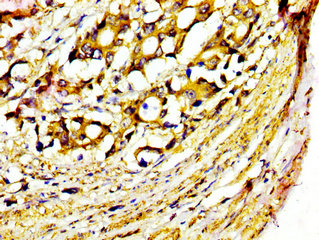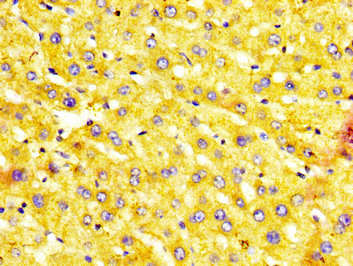Full Product Name
Rabbit anti-Homo sapiens (Human) MST1 Polyclonal antibody
Alternative Names
D3F15S2 antibody; DNF15S2 antibody; Hepatocyte growth factor like protein alpha chain antibody; Hepatocyte growth factor like protein antibody; Hepatocyte growth factor like protein beta chain antibody; Hepatocyte growth factor like protein homolog antibody; Hepatocyte growth factor-like protein beta chain antibody; HGFL antibody; HGFL_HUMAN antibody; Macrophage stimulating 1 (hepatocyte growth factor like) antibody; Macrophage stimulatory protein antibody; Macrophage-stimulating protein antibody; MSP antibody; MST1 antibody; NF15S2 antibody; OTTHUMP00000208927 antibody
Immunogen
Recombinant Human Hepatocyte growth factor-like protein (363-465AA)
Immunogen Species
Homo sapiens (Human)
Conjugate
Non-conjugated
The MST1 Antibody (Product code: CSB-PA015055LA01HU) is Non-conjugated. For MST1 Antibody with conjugates, please check the following table.
Available Conjugates
| Conjugate |
Product Code |
Product Name |
Application |
| HRP |
CSB-PA015055LB01HU |
MST1 Antibody, HRP conjugated |
ELISA |
| FITC |
CSB-PA015055LC01HU |
MST1 Antibody, FITC conjugated |
|
| Biotin |
CSB-PA015055LD01HU |
MST1 Antibody, Biotin conjugated |
ELISA |
Purification Method
>95%, Protein G purified
Concentration
It differs from different batches. Please contact us to confirm it.
Buffer
Preservative: 0.03% Proclin 300
Constituents: 50% Glycerol, 0.01M PBS, pH 7.4
Tested Applications
ELISA, IHC
Recommended Dilution
| Application |
Recommended Dilution |
| IHC |
1:200-1:500 |
Storage
Upon receipt, store at -20°C or -80°C. Avoid repeated freeze.
Lead Time
Basically, we can dispatch the products out in 1-3 working days after receiving your orders. Delivery time maybe differs from different purchasing way or location, please kindly consult your local distributors for specific delivery time.
Usage
For Research Use Only. Not for use in diagnostic or therapeutic procedures.








